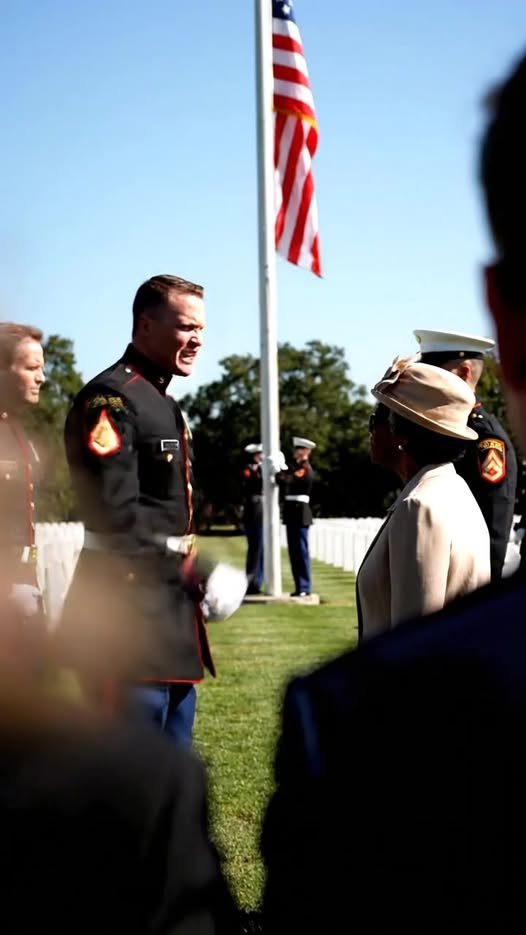“A long time ago.”
I didn’t take it. I couldn’t. It wasn’t an ID.
“I’m sure many people knew the General, ma’am. He was a great man. But if you’re not on the approved list, I cannot grant access.”
I gestured toward the parking area, starting my pre-programmed redirect.
“There will be a public memorial service tomorrow at the base chapel. Perhaps you could attend that one. I’m very sorry.”
I was about to turn to the next guest when a sharp voice cut through the air.
“Sergeant. Is there a problem here?”
I snapped to. Lieutenant Commander James Morrison.
A “fast-burner” from the Navy, on liaison duty. He was all sharp creases, expensive aftershave, and the barely-concealed irritation of a man who lives by his Outlook calendar. He was everything I hated about the new officer corps: all polish, no grit.
“No, sir,” I said. “Just explaining protocol to this civilian.”
Morrison’s eyes swept over the woman, and the disdain was so thick I could smell it. It was a physical, tangible thing.
He didn’t see a person; he saw an obstacle. He’d spent the morning in a panic, rearranging seating charts for three-star admirals and making sure the coffee was hot for a Senator. This… this… was an imperfection in his perfect day.
“Ma’am, you need to leave the premises immediately,” Morrison snapped. His voice was a weapon, sharp and commanding, meant to cow, not to communicate. “This is a military installation, and you are disrupting official proceedings,” he continued, his voice rising.
“Security personnel,” he barked, though he was looking right at me, “escort this woman to the exit.”
I felt my spine stiffen. The word “escort” meant putting my hands on her. I didn’t want to do that.
But the woman… she didn’t move. She didn’t flinch. She just stood there, that paper still held out, her expression as calm and unmovable as the granite tombstones surrounding us.
“I served,” she said, her voice still a whisper, but it cut through Morrison’s command like a diamond. “I have a right to be here.”
Morrison actually let out a huff of exasperated breath. He took a step closer to her, invading her space, a classic intimidation tactic.
“You served?” he sneered, the condescension dripping from every syllable. “In what capacity? Kitchen staff?
Administrative support?”
He gestured to the chapel, to the rows of decorated officers. “This funeral is for actual military personnel. Officers.
People who served with distinction in combat operations.” He leaned in, his voice dropping to a venomous whisper. “Not support staff who want to claim connection to glory they never earned.”
A young Corporal next to me shifted his weight, his face flushing with discomfort. He was a kid, but even he knew this was wrong.
I kept my face a mask of stone. I am a ghost. I am not here.
But I was. And I was watching. Morrison wasn’t done.
He was on a roll, puffing himself up. “I need you to understand something. General Caldwell was a hero.
He led special operations in three war zones. He commanded elite units that most people don’t even know exist. His service record is classified at levels you couldn’t possibly understand.”
He jabbed a finger toward the exit.
“So, unless you have legitimate credentials proving you are on my list, you need to leave. Now.”
The woman’s hand, the one holding the paper, trembled. Just slightly.
But her voice, when it came, was pure steel. “Please. Just check.
My designation.”
“Your… designation?” Morrison laughed. It was a harsh, ugly sound that made several guests in line turn and look. He was creating the very scene he claimed to be preventing.
“You mean your employee number? Your civil service grade?”
He turned to me, his eyes blazing with self-importance. “Sergeant, call base security.
Have them remove this woman immediately. If she resists, charge her with trespassing on federal property.”
I reached for my radio. This was it.
The line I didn’t want to cross. I was going to have this old woman arrested at a General’s funeral. I could feel the eyes of the other guests on me.
I could feel the shame burning in my gut. But as my fingers touched the radio, something made me hesitate. She hadn’t raised her voice.
She hadn’t cried. She hadn’t pleaded. She just stood with this… this dignity.
This quiet, profound dignity that was so at odds with Morrison’s frothing accusations. My hand dropped from the radio. I looked at her, really looked at her.
“What’s your name, ma’am?” I asked. My voice was softer than I intended. Morrison shot me a look of pure fury.
“Sergeant, I gave you an order—”
“What’s your name, ma’am?” I repeated, my eyes locked on hers. “Alise Thornton,” she replied. Morrison, furious at my insubordination, whipped out his tablet.
“Fine!” he spat, stabbing at the screen with his finger. “Thorn… Thornton? No.
No Elise Thornton on this list. No ‘Thornton’ at all, actually.”
He looked up, his face a mask of smug satisfaction. “There you have it.
No authorization.” He pointed at me. “Sergeant Thompson, I am giving you a direct order. Remove her.
Now.”
“Wait.”
The voice that spoke was gravel and rust. It was the sound of command forged in jungles, not classrooms. We all turned.
Command Sergeant Major Victor Hayes was walking toward us. Hayes was a living legend. Vietnam.
Grenada. Desert Storm. His chest was a billboard of combat history.
He was old-school Army, the kind of man who had forgotten more about soldiering than Morrison would ever know. His knees were shot, but his eyes… his eyes were as sharp as broken glass. He ignored Morrison.
He ignored me. His entire focus was on the woman. “Ma’am,” he said, his voice respectful.
“Did you say your name was Elise Thornton?”
“Yes, Sergeant Major.”
Something flickered in Hayes’s face. Not recognition. More like the ghost of a memory.
The echo of a song he hadn’t heard in fifty years. “What unit did you serve with?” he asked. Morrison, unable to stand being ignored, stepped forward.
“Sergeant Major, this woman has no credentials. She’s not on the list. I’ve already—”
“I wasn’t talking to you, Commander.”
Hayes said it without looking at him.
He just cut him off, cold. The authority in those six words was more absolute than any order Morrison had ever given. Morrison’s mouth clicked shut, his face turning a blotchy red.
Hayes turned back to the woman. “Ma’am. I asked you a question.”
Elise Thornton seemed to stand a little straighter.
The stoop in her shoulders lessened. “I can’t tell you my unit, Sergeant Major,” she said. “You know how it works.”
Hayes nodded, slow.
A deep, knowing nod. “Then tell me your designation. Your operational call sign.”
The question hung in the air.
I looked at Morrison. He was completely lost, his face a mask of confusion. I was lost.
What the hell was a “call sign” for a woman who looked like a retired schoolteacher? Hayes just watched her, his eyes narrowed, his entire being focused on her, waiting. Elise Thornton met his gaze.
And for the first time, a flicker of… something… crossed her face. Not pride. Not anger.
It was older than that. Deeper. It was grief and iron, mixed together.
“Night Angel,” she said. Her voice was quiet, but the name landed like a grenade. For a single, silent heartbeat, nothing happened.
Then, the world tilted on its axis. Command Sergeant Major Hayes went rigid. I mean, ramrod rigid.
The color drained from his face, leaving it a sickly, pale gray. His jaw clenched so hard a muscle jumped in his cheek. “Dear God,” he whispered.
It was a prayer. It was a curse. “What?” Morrison demanded, his voice high and reedy.
“What’s ‘Night Angel’? Is that supposed to mean something?”
Hayes didn’t answer. He was already moving.
He turned and ran—as fast as his old knees would carry him—toward the chapel. He shoved past a two-star admiral in the doorway, ignoring the man’s shocked protest. “Don’t let her leave!” Hayes shouted back over his shoulder, his voice ragged with an emotion I couldn’t place.
“Keep her right there! Don’t… let… her… move!”
Morrison stared after him, completely bewildered. “What the hell is happening?”
I had my phone out.
My fingers were flying. “Night Angel,” I muttered, typing it into the military database. “Night… Angel.”
The screen flashed.
ACCESS DENIED. FILE REDACTED. CLASSIFICATION: ONYX-LEVEL.
UNAUTHORIZED INQUIRY LOGGED. My blood went cold. I had a Top Secret clearance.
I had never, in my entire career, seen an “ONYX” classification. I didn’t even know it existed. “Sir,” I said to Morrison, my voice trembling.
“Sir, I’m getting nothing. Black flags. Security locks.
This designation… it’s buried under classifications I’ve never even seen before.”
Inside the chapel, all hell was breaking loose. Hayes, a Command Sergeant Major, had just stormed up the main aisle, in the middle of the eulogy. He ignored the chaplain, ignored the rows of stunned officers.
He marched straight to the front pew, where the highest-ranking officer in the entire building was sitting. General Marcus Holloway. Four stars.
Commander of United States Special Operations Command. SOCOM. The man in charge of every SEAL, every Delta operator, every shadow warrior on the planet.
Hayes leaned down, his face inches from the General’s, and whispered two words. “Night Angel.”
The reaction was instantaneous. And it was terrifying.
General Holloway, a four-star, stood up. In the middle of the service. He didn’t excuse himself.
He didn’t apologize. He just… rose. The chaplain at the pulpit stopped, his mouth open, the eulogy dying on his lips.
Holloway turned and walked straight up the center aisle, his face carved from stone, his eyes fixed on the chapel doors. A four-star general had just walked out of a two-star’s funeral. And I was standing at the checkpoint, with the woman who had made him do it.
Part 2
The massive oak doors of the chapel burst open, slamming against the stone walls. The sound cracked through the reverent silence like a rifle shot. General Holloway emerged, his four-star rank glittering in the morning light.
He moved with a speed and precision that was unnerving. His eyes weren’t just looking; they were scanning, a tactical assessment of the entire courtyard. He ignored Morrison.
He ignored me. His gaze swept the area until it locked onto Elise Thornton. And there he stopped.
Morrison, seeing the four-star, snapped to attention so fast he almost gave himself whiplash. His face was pale, slick with a sudden, cold sweat. “General Holloway, sir!” he stammered, his voice cracking.
“We have a… a situation here with an unauthorized civilian who—”
“Shut up.”
Holloway didn’t shout. He didn’t look at Morrison. He just cut him down with two words, his voice flat and cold as a slab of marble.
Morrison’s mouth clicked shut. The sound was audible. General Holloway walked, his pace measured now, until he was standing exactly three feet in front of Elise Thornton.
He didn’t speak. For a long, agonizing moment, he just looked at her. He studied her face, her worn coat, her steady eyes.
I saw something move in his jaw, a flicker of some powerful, restrained emotion that would have been tears on a lesser man. When he finally spoke, his voice was rough, like he’d swallowed gravel. “Captain… Thornton?” he asked.
Not a question of her name, but of her identity. He was asking if she was that Thornton. The entire world stopped.
Captain? Morrison made a small, choking sound. I felt the blood drain from my own face.
“Yes, sir,” Elise said, her voice just as quiet as before. “It has been a long time.”
“How long?” Holloway asked. His voice was low, almost personal.
“Forty-three years since my last official operation,” she replied, her words clear and precise. “Forty-six since ‘Night Angel’ was my primary designation.”
Holloway nodded slowly, as if processing a heavy weight. “You served with Caldwell?”
“I did.
Back when he was just a lieutenant.” A small, sad smile touched her lips. “Before any of this,” she gestured vaguely at the chapel, the flags, the ceremony. “Before he became the man everyone’s honoring today.”
By now, the chapel doors were crowded.
The disruption had pulled dozens of high-ranking officers out of the service. A Rear Admiral, two more Major Generals, a gaggle of Colonels and Commanders. They formed a silent, confused semicircle around us, sensing the shift in gravity but not understanding its cause.
Morrison, seeing his career evaporate before his eyes, found his voice. He had to try. “Sir, I apologize!” he blurted out, his voice desperate.
“She had no credentials! No identification! She wasn’t on the approved list!
I was just following standard protocol for a secure event… I—”
“Commander Morrison,” Holloway interrupted. His voice was deathly quiet, but it carried across the stone courtyard with absolute, terrifying authority. Every officer present went still.
“Do you know what ‘Night Angel’ means?” Holloway asked. “No, sir. I…”
“Then let me educate you.”
Holloway turned, not just to Morrison, but to the entire crowd of decorated officers.
He became a general addressing his troops. “In 1977,” he began, his voice resonating with history, “the United States military ran a black operations program so classified that it officially never existed. Its file designation was ‘ONYX.’ The mission parameters were simple: send operators into denied territory where no American soldier could be acknowledged.
No backup. No extraction. No recognition if captured or killed.”
A collective, silent gasp seemed to come from the officers.
I was frozen. My unauthorized search… ONYX. “The operators chosen for this program had to be invisible,” Holloway continued, his eyes hardening.
“Completely, utterly deniable. And because our enemies, in East Berlin, in Saigon, in Beirut, were looking for American men… we needed someone they would never, ever suspect.”
He paused, letting the weight of his words sink in. “We recruited women.
Black women, specifically. Twelve of them, initially. Pulled from Army Intelligence, the Signals Corps, even two from Air Force Special Ops.
We gave them language training, tactical instruction, and infiltration techniques that were twenty years ahead of standard Special Forces curriculum.”
“We erased their service records,” he said, his voice dropping. “Gave them new identities. And we sent them into the dark, to do the impossible.”
My stomach felt like it was full of wet cement.
Morrison was visibly shaking. “Only three of those twelve operators survived the full program,” Holloway said, his voice grim. He turned and looked directly at Elise.
“Captain Elise Thornton was one of them.”
He pointed a finger at her, not in accusation, but in proclamation. “Her call sign was ‘Night Angel.’ Earned during an exfiltration operation in Cambodia, where she carried two wounded Rangers—Rangers—across fifteen miles of enemy territory, under fire. Then, wounded herself, she talked her way through three separate enemy checkpoints using five different cover identities.”
The silence was absolute, broken only by a distant siren.
“That was just one of seventeen classified missions she completed over seven years,” Holloway said. He let the number hang in the air. Seventeen.
“Captain Thornton was captured,” he went on, his voice becoming harder, “Twice. Interrogated. Tortured.
She never broke. She never revealed her identity or her mission. The scars from those interrogations earned her a Purple Heart that no one outside a six-person classified review board even knows exists.”
He was glaring at the crowd now, daring anyone to move.
“She was recommended for the Distinguished Service Cross,” he said, his voice shaking with a contained rage. “Three separate times. All three recommendations were sealed under National Security Protocols.
Because acknowledging her service then would have exposed operations that are still classified today.”
Then, he turned. He took one slow, deliberate step toward Morrison. The Lieutenant Commander flinched, as if expecting a physical blow.
“And you,” Holloway whispered, the word full of venom. “You told her she was ‘kitchen staff.’ You told her she was ‘support personnel.’ You told her she was claiming glory she never earned.”
“Sir!” Morrison choked out, tears of panic in his eyes. “Sir, I didn’t know!
I had no way of… of…”
“That’s exactly right, Commander!” Holloway roared, the sudden explosion of sound making us all jump. “YOU DIDN’T KNOW! Because people like Captain Thornton did their job so well, so quietly, that history forgot them!
They were erased, on purpose, for operational security. And then… and then we never wrote them back in.”
His voice broke, just for a second, with a raw, profound sadness. “They gave everything.
They asked for nothing. And they faded into obscurity. While men like you… and men like me… got to wear our medals and tell our stories.”
He turned back to Elise, his entire demeanor changing.
The rage vanished, replaced by a deep, aching respect. “General Caldwell knew,” he said softly. “He was one of the only ones who did.
He served as your intelligence liaison during the Tehran operation in 1979.”
He looked at her, a question in his eyes. Elise nodded. “You saved his life,” Holloway stated.
“Twice.”
“He was a good man,” Elise said, her voice thick with emotion for the first time. “Even back then. I’m sorry for his loss.”
“He would have wanted you here,” Holloway said, his voice firm.
“He… he spoke about ‘Night Angel’ sometimes. In classified briefings. Never by name.
Just… as ‘the operator who showed me what real courage looked like.’ I never knew… I never knew it was you.”
He took a deep breath, pulling himself back to his full, four-star command. He turned to the assembled officers, and his voice was a clarion call. “Captain Elise Thornton will be seated in the front row of this service, next to the Joint Chiefs of Staff.
Anyone who has a problem with that can take it up with me. Personally. After the ceremony.”
He looked at me.
My name was Thompson. I was a ghost. But he saw me.
“Master Sergeant Thompson,” he commanded. “Yes, sir!” I snapped, my salute so crisp it hurt my own shoulder. “Escort Captain Thornton inside.
Immediately.”
“Yes, sir!”
I turned to Elise, my heart pounding so hard I thought it would break my ribs. I offered her my arm. “Ma’am… Captain… if you’ll allow me.”
She looked at my arm, then at my face.
She smiled, a small, kind smile, and placed her weathered hand in the crook of my elbow. As I began to walk her toward the chapel, I heard Holloway’s voice, low and deadly, behind me. He was speaking to Morrison.
“Commander,” he said. “You will write a formal letter of apology to Captain Thornton. You will also write a 10-page report on the history of women in classified military operations, with particular focus on the ONYX-level programs of the 1970s.
That report will be on my desk in two weeks. If I find your understanding of history… inadequate… we will discuss your fitness for continued service.”
“Yes, sir,” Morrison whispered, his voice broken. “And Commander,” Holloway added.
“The next time someone tells you they served… believe them. The most dangerous warriors this nation has ever produced weren’t the ones on the recruitment posters. They were the ones nobody ever saw coming.”
I walked Captain Elise Thornton into that chapel.
As we crossed the threshold, the entire room—generals, admirals, politicians, all of them—saw the four-star’s empty seat. They saw us walking down the center aisle. And as one, they rose to their feet.
The entire chapel stood. Not for a general. Not for a politician.
But for an old woman in a worn-out coat. Generals and admirals, men I had only seen on television, men who commanded armies, stepped out into the aisle, their faces masks of awe and respect. I saw older officers, men from Hayes’s generation, openly weeping.
They knew. They remembered the rumors. The ghosts.
The Night Angels. I seated Captain Thornton in the front row. A seat was immediately found for her, right next to the Chairman of the Joint Chiefs, who leaned over and took her hand, whispering something to her.
The chaplain, his face pale, resumed his eulogy. His words were different now. “General Caldwell understood,” he said, his voice trembling, “that true service… true service often goes unrecognized.
That the most important missions… are the ones that can never be acknowledged. That honor isn’t about the medals we wear. It’s about doing what’s right, when no one will ever know you did it.”
I stood in the back of the chapel, my duty forgotten.
I was no longer a ghost. I was a witness. Later, at the graveside, after the 21-gun salute had echoed and the bugler had played Taps, the honor guard meticulously folded the flag that had draped Caldwell’s coffin.
The officer in charge prepared to present it to the General’s widow. But he paused. He looked at General Holloway, who was standing beside Elise.
Holloway gave a single, sharp nod. The officer, holding the flag, walked past the widow. He walked directly to Elise.
He knelt before her, holding the folded flag. “On behalf of a grateful nation,” he said, his voice thick with emotion, “and in recognition of service that transcends any official record… please accept this flag. In honor of your sacrifice, and in memory of your brother in arms, General Caldwell.”
Elise took the flag with shaking hands.
And for the first time that day, the woman of iron, the Night Angel, broke. Tears streamed down her weathered cheeks, a quiet, silent testament to 46 years of silence. That evening, a photo began circulating on classified military networks.
It showed an elderly Black woman in a simple dress, holding a folded American flag, sitting in the front row of a general’s funeral, surrounded by the most powerful military officers in the world. The caption was simple. “Night Angel.
Finally home.”
I went home that night. I took off my uniform. I looked at my own ribbons in their display case.
And for the first time in my career, I felt small. I, who had guarded the Tomb, had stood guard at the door of a hero and, following protocol, had tried to turn her away. Morrison was wrong.
I was wrong. Protocol is not honor. Regulations are not respect.
I learned more about being a soldier from that old woman in a cloth coat than I had in fifteen years in the Old Guard. She was the ghost. She was the shadow.
She was the quiet, unseen dignity that had guarded us all, and we never even knew her name.





